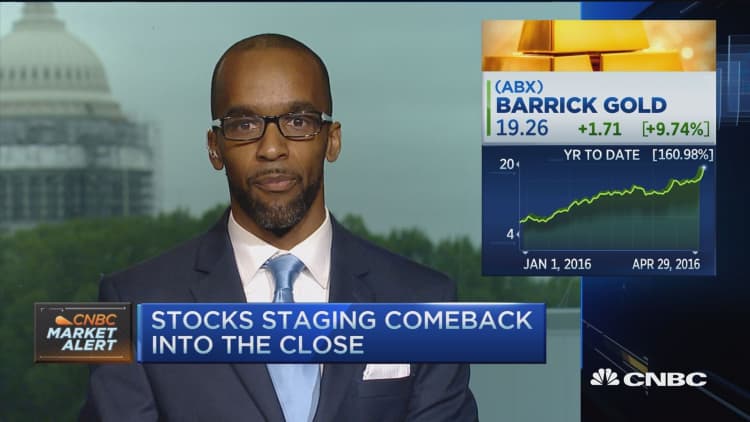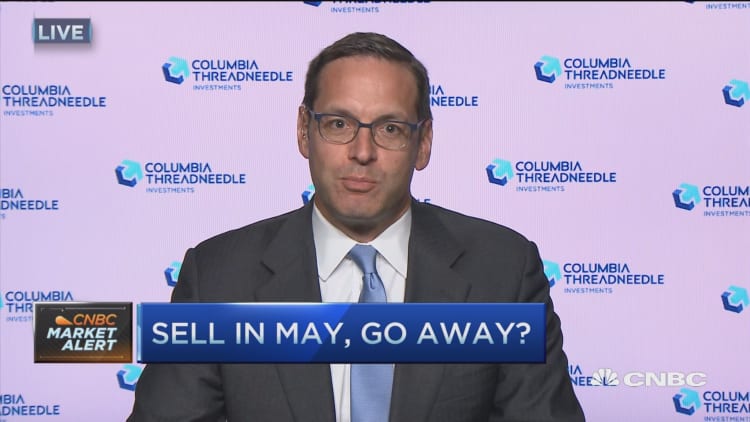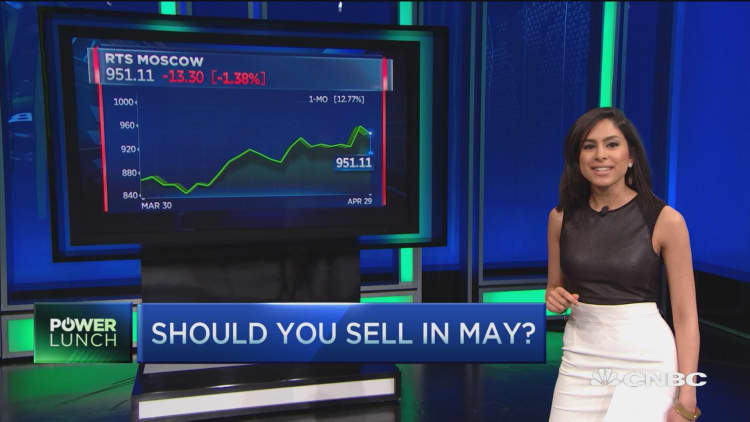


Stocks are entering the time of year when market gains are historically the lowest and volatility can be the highest.
When traders talk about the "sell in May, go away" phenomenon, they are actually talking about the six months from May to October when the market's performance on average lags the other six months. Over the past 50 years, the has averaged a smallish 0.9 percent gain in the period versus the 6.3 percent average gain of November through April, according to Bespoke. As for May itself, the Dow has been virtually flat, up 0.1 percent on average over the past 100 years, and even flatter, up just an average 0.05 percent, over the past 20 years.
The challenges for the period this year include potential Fed rate hikes, the softish economy and the added intrigue of political risk — both from the U.S. presidential election and the U.K. referendum vote on whether to remain in the European union. As for the coming week, stocks face the April employment report on Friday, earnings reports from about a fifth of the S&P 500 companies and speeches from at least a half dozen Fed officials.
"We're back near cycle highs for the valuations, and as we look forward at the coming calendar over the next three to six months, we see a lot of potential catalysts for volatility and pullbacks, depending on how things work out," said Daniel Suzuki, Bank of America/Merrill Lynch equity strategist. "In June, you have what we think is a decent probability of a Fed rate hike and you have the EU referendum. Also around that time, you're going to be getting the final presidential candidates. I think as the election debate heats up, it definitely has the potential to add a lot of volatility to the markets depending on how polarizing the candidates are."
So far this year, the S&P 500 is up 1 percent after a sharp double-digit sell-off and the stunning reversal since February. The S&P 500 Friday ended April at 2,065, with a slight gain of 0.3 percent for the month. For the November through April period, ending Friday, the S&P 500 was about 0.7 percent higher.
Suzuki expects the S&P to end the year at 2,000, but he sees reasons it could grind higher before selling off. One is that there is an under-positioning in equities among fund managers, who continued to build cash even as stocks soared in February and March. There is also a lack of positive sentiment for the market, and that is a contrarian indicator.
Julian Emanuel, equity and derivatives strategist at UBS, said he had been thinking the market could avoid "sell in May" this year, but he now expects to see it at least take a pause. "There is a void here. We're into the back half of earnings season. The Fed doesn't (officially) speak again until it meets in June, and you've got international and political risk. Yet those events are still six weeks away, so there's really a void during the month of May that, given the distance we've gone and the fact the earnings season is validating our dismal expectations, it's very difficult to see how stocks really can do anything other than pause in the near term," Emanuel said. But he does see stocks heading higher later in the year, with the S&P 500 reaching 2,175.
"It's not going to be a plunge like we saw in January and February, but trading back down below the 200-day moving average, currently 2,015, is entirely plausible," said Emanuel. As stocks sold off at the end this week, the VIX, or volatility index, has been edging higher and on Friday was at 17 for the first time since March 15.
Jack Ablin of BMO Private Bank says a big problem for the stock market is that valuations have gotten too high, and the market should pull back, providing more attractive places to buy in the next several months. He said the Fed is frustrating the markets, but so might the political risk as investors turn to the presidential election. Some analysts expect the election to have more impact nearer to the conventions, when the rhetoric rises.
"These are candidates that have among the highest levels of dislikes that's ever been measured," he said.
Not all strategists see pullbacks near term. Binky Chadha, chief global strategist, asset allocation at Deutsche Bank, said stocks could be heading into a positive time after trading in a range for the past 15 months, held back by lackluster U.S. economic data and a series of events, like the scares earlier this year over falling oil prices or China's currency devaluation.
In the 15 months, Chadha said outflows from equities totaled $220 billion. Recently some of that money has come back into stocks, but there are still managers that are underinvested. Another factor that is a positive for equities is the approximately $10 billion on average in corporate buybacks that take place each week.
"I remain basically constructive here, so (the market should go higher) unless you get a shock or a risk that causes people to go short in a big way," he said.
Chadha dismissed the seasonal factors as an issue for the market. "It's not a tradable seasonlity. Over the last few years, we got hit by shocks in the summertime. I don't think the temperature has anything to do with the shocks," he said.
As for the coming week, the jobs report for April is the most important data. There is also ISM manufacturing data Monday and ISM services on Wednesday. China reports PMI data Tuesday and Thursday.
Deutsche Bank chief U.S. economist Joseph LaVorgna said he expects to see 175,000 jobs were created in April, and an unchanged unemployment rate at 5 percent.
"The numbers will be decent, but I'm guessing they are not going to be stronger, because tax receipts are slowing," he said. "We've had a high concentration of retail jobs in the last several months, and I think could see some weakness there."
The Fed speakers start Sunday with New York Fed President William Dudley, the official viewed as most closely aligned with Fed Chair Janet Yellen. About a half dozen other speakers are expected during the week, but not the Fed chair.
"[Dudley's] going to continue to be cautious as he's been for some time," said LaVorgna. "I'd be surprised if he said anything other than that he's cautiously watching the outlook, and they're data dependent. He's not in a mood to be moving rates yet. I don't believe June is on the table unless you have some shockingly strong data."
Wells Capital Management chief investment strategist James Paulsen said he does not expect the conflicting views of Fed officials to ruffle markets this week, as they have done in the past.
"We have 12 of them going around yapping, and it's the same result as if [former Fed Chairman Alan] Greenspan mumbled through a boring speech and nobody knew what he meant anyway. I think it's largely irrelevant. It seems to be the impact of these Fed speeches is getting to be less and less. I still think we could end up with multiple rate hikes before the year is out," said Paulsen. "We're in a perpetual state of suspension where we're waiting for the policy to turn to easing, and it never ends. You used to tear the Band-Aid off and get over it. Here we tear a little bit and stop again."
There are dozens of earnings with Time Warner and News Corp heading up reports from media companies, and energy names like Royal Dutch Shell and Valero. AIG and other insurers also report. Earnings for the S&P companies are down about 5.7 percent based on estimates and the actual results of companies that have already reported, according to Thomson Reuters. More than 70 percent of companies are beating earnings forecasts.
"We are halfway through earnings. Everybody sounds a little bit cautious, but there's nothing to suggest things are getting worse," said Chadha.
What to Watch
Sunday
7:15 p.m. New York Fed President William Dudley at Atlanta Fed event
Monday
Earnings: AIG, Anadarko Petroleum, Sturm Rogers, Sysco, Helmerich and Payne, Diamond Offshore, Chemours, Lowes, CNA Financial
9:45 a.m. Manufacturing PMI
10 a.m. ISM Manufacturing; construction spending
11 a.m. European Central Bank President Mario Draghi speaks at Asian Development Bank meeting
2 p.m. Senior loan officer survey
5:30 p.m. San Francisco Fed President John Williams, Milken Institute
Tuesday
Earnings: Pfizer, UBS, Clorox, Archer Daniels Midland, Sprint, CVS Health, Halliburton, Estee Lauder, Encana, Cummins, Devon Energy, CBS, Newfield Exploration, Etsy, Western Union, Match Group, Zillow, Duke Energy, Emerson, BNP Paribas, HSBC, Starwood Hotels, Valero Energy, Brink's, The New York Times Company, Pitney Bowes
Vehicle sales
10:30 a.m. Cleveland Fed President Loretta Mester
7 p.m. Atlanta Fed President Dennis Lockhart
Wednesday
Earnings: Time Warner, Tesla, Fitbit, GoDaddy, Yamana Gold, Zynga, Siemens, Priceline, Royal Dutch Shell, HollyFrontier, AB InBev, Delphi Automotive, 21st Century Fox, Virtu Financial, Kate Spade, Generac, Shopify, Humana, MetLife, Allstate, CF Industries, Chubb, Kraft Heinz, Performance Food, Zoetis, Whole Foods, Weight Watchers
8:15 a.m. ADP employment
8:30 a.m. International trade; productivity and costs
9:45 a.m. Services PMI
10 a.m. ISM nonmanufacturing; factory orders
6:30 p.m. Minneapolis Fed President Neel Kashkari on too big to fail
Thursday
Earnings: Alibaba, DreamWorks Animation, SeaWorld, Fortress Investment, Kellogg, Activision Blizzard, Time Inc, News Corp, Fiserv, Apollo, WageWorks, El Pollo Loco, FireEye, GoPro, Motorola Solutions, AMC Networks, Merck, Regeneron, Discovery Communications, Wingstop, Herbalife, Church & Dwight, News Corp
8:30 a.m. Initial claims
9:45 a.m. Services PMI
10 a.m. ISM nonmanufacturing; factory orders
11:50 a.m. St. Louis Fed President James Bullard
7:15 p.m. Atlanta Fed's Lockhart, Dallas Fed President Rob Kaplan, St. Louis Fed's Bullard, San Francisco Fed's Williams at Hoover Conference
Friday
Earnings: Cigna, ArcelorMittal, Weyerhaeuser, Willis Towers Watson, Buckeye Partners, Dentsply, Exelon
8:30 a.m. Employment report; international trade
— By CNBC's Patti Domm. Follow her on Twitter @pattidomm.






